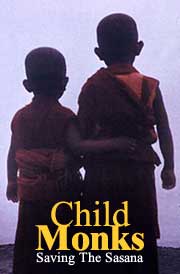Princeton prof. says 'No' to Sri Lanka child monks
Kyodo News
COLOMBO -- A campaign by Sri Lanka's prime minister to
recruit 2,000 children into Buddhist monastic orders to cope with a shortage of monks has
met criticism from a scholar who says child ordination is against Buddhist doctrine.
 Gananath
Obeyesekere, an anthropology professor at Princeton University, says the campaign targets
children as young as 5 years even though Theravada Buddhism doctrine states that a boy
must be at least 15 years of age to become a monk.
Gananath
Obeyesekere, an anthropology professor at Princeton University, says the campaign targets
children as young as 5 years even though Theravada Buddhism doctrine states that a boy
must be at least 15 years of age to become a monk.
The Buddha himself
ordained at just 5 years his only son Rahula, but this was regarded an exception rather
than a rule, Obeyesekere said.
After being rebuked
for the act by his own father, the Buddha specified that one must not only have parental
consent to ordain a child, but that the child must be 15 years of age. If not, the youth
must have the ''physical maturity'' of a 15-year-old.
Sri Lanka's project
to mass-recruit children into Buddhist orders disregards these considerations, says
Obeyesekere, himself a Sri Lankan Buddhist.
Prime Minister
Ratnasiri Wickramanayake, who is also minister for Buddhist affairs, is the father of the
campaign and is encouraging public donations for the endeavor.
The project
includes sponsors for each novice monk and a monthly allowance drawn from a fund of
contributions.
Reportedly, more
than 1,000 people have already applied, although the final figure was not immediately
known, nor was the breakdown of their ages.
The prime minister
told reporters recently that he conceived the plan after receiving thousands of letters
from senior Buddhist monks complaining, among other things, that fewer people were joining
the clergy. This, he said, had even led to the closure of many temples around the country.
''I found there was
a problem and this is the solution,'' he asserted.
He believes his
plan will strengthen Buddhism in the country and bolster the ranks of a clergy that was in
danger of dying out.
But Obeyesekere, in
his remarks published in the Colombo newspapers Sunday Island and the Daily News, says if
more monks are needed for the orders, older people should be recruited as they are
increasingly given to meditation and usually have a good knowledge of the Buddha
teachings.
Most have meager
pensions, so free monastic board and lodging would be added incentives, the scholar, who
has written extensively on Buddhism, suggested.
But one major
reason Obeyesekere opposes child recruitment is that the very young are vulnerable to
sexual abuse, which he says is ''notoriously associated'' will all forms of
institutionalized monasticism.
The possibility of
child abuse in Buddhist monasteries ''must be faced honestly and squarely,'' he stressed.
Unlike adult monks,
children have little chance of resisting sexual advances, the professor added.
''Even the presence
of guardians, or sponsors is not protection. How does the guardian inquire into such
possibilities when the mere talk of homoerotic practices is taboo?,'' Obeyesekere asked.
He also asked why
those promoting the campaign have not set an example by being ordained themselves or
having their own children or grandchildren ordained.
The prime
minister's office, however, reacted hotly to the criticism.
One of
Wickramanayake's personal assistants said any opposition to the project ''was affiliated
to a conspiracy to wipe Buddhism from the country.''
The prime minister
has only the best of intentions, he said, on condition of anonymity, noting ordinations
take place only with the consent of parents and high priests of the temples concerned and
the scheme provides children with food, lodging and education that poverty may otherwise
have denied them.